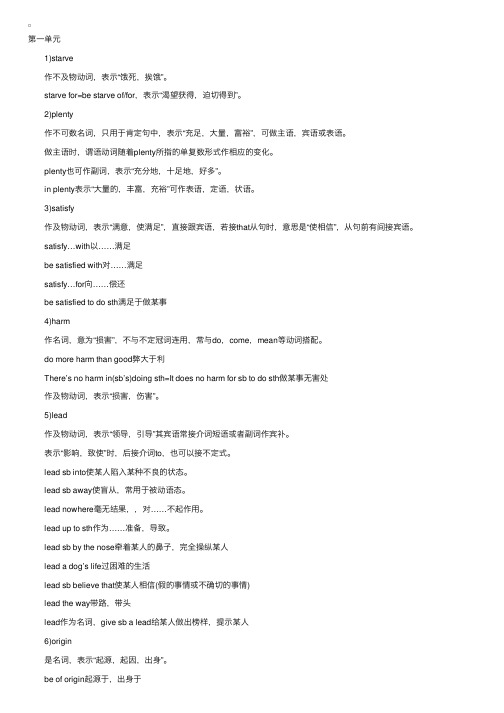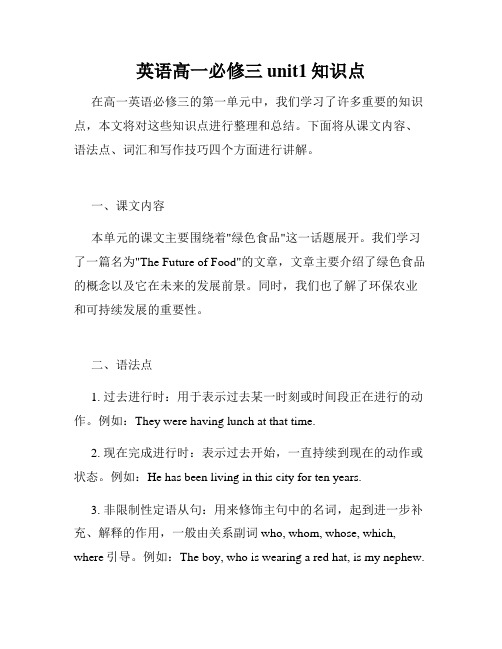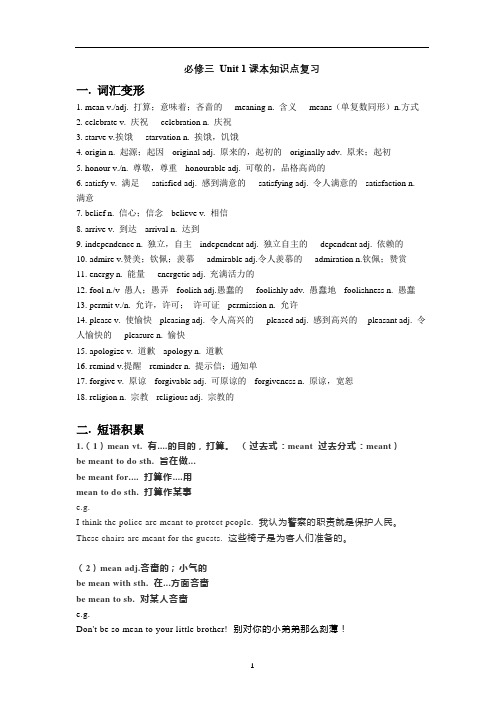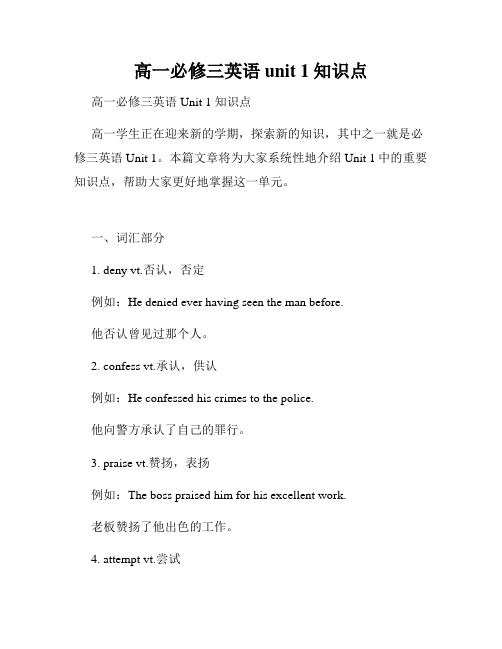高一英语必修三第一单元知识点总结
高一英语必修三知识点:第一单元

第⼀单元 1)starve 作不及物动词,表⽰“饿死,挨饿”。
starve for=be starve of/for,表⽰“渴望获得,迫切得到”。
2)plenty 作不可数名词,只⽤于肯定句中,表⽰“充⾜,⼤量,富裕”,可做主语,宾语或表语。
做主语时,谓语动词随着plenty所指的单复数形式作相应的变化。
plenty也可作副词,表⽰“充分地,⼗⾜地,好多”。
in plenty表⽰“⼤量的,丰富,充裕”可作表语,定语,状语。
3)satisfy 作及物动词,表⽰“满意,使满⾜”,直接跟宾语,若接that从句时,意思是“使相信”,从句前有间接宾语。
satisfy…with以……满⾜ be satisfied with对……满⾜ satisfy…for向……偿还 be satisfied to do sth满⾜于做某事 4)harm 作名词,意为“损害”,不与不定冠词连⽤,常与do,come,mean等动词搭配。
do more harm than good弊⼤于利 There’s no harm in(sb’s)doing sth=It does no harm for sb to do sth做某事⽆害处 作及物动词,表⽰“损害,伤害”。
5)lead 作及物动词,表⽰“领导,引导”其宾语常接介词短语或者副词作宾补。
表⽰“影响,致使”时,后接介词to,也可以接不定式。
lead sb into使某⼈陷⼊某种不良的状态。
lead sb away使盲从,常⽤于被动语态。
lead nowhere毫⽆结果,,对……不起作⽤。
lead up to sth作为……准备,导致。
lead sb by the nose牵着某⼈的⿐⼦,完全操纵某⼈ lead a dog’s life过困难的⽣活 lead sb believe that使某⼈相信(假的事情或不确切的事情) lead the way带路,带头 lead作为名词,give sb a lead给某⼈做出榜样,提⽰某⼈ 6)origin 是名词,表⽰“起源,起因,出⾝”。
英语高一必修三unit1知识点

英语高一必修三unit1知识点在高一英语必修三的第一单元中,我们学习了许多重要的知识点,本文将对这些知识点进行整理和总结。
下面将从课文内容、语法点、词汇和写作技巧四个方面进行讲解。
一、课文内容本单元的课文主要围绕着"绿色食品"这一话题展开。
我们学习了一篇名为"The Future of Food"的文章,文章主要介绍了绿色食品的概念以及它在未来的发展前景。
同时,我们也了解了环保农业和可持续发展的重要性。
二、语法点1. 过去进行时:用于表示过去某一时刻或时间段正在进行的动作。
例如:They were having lunch at that time.2. 现在完成进行时:表示过去开始,一直持续到现在的动作或状态。
例如:He has been living in this city for ten years.3. 非限制性定语从句:用来修饰主句中的名词,起到进一步补充、解释的作用,一般由关系副词who, whom, whose, which, where引导。
例如:The boy, who is wearing a red hat, is my nephew.4. 由疑问词引导的特殊疑问句:包括对地点、时间、原因、方式、人物等提问。
例如:Where did you go yesterday?三、词汇1. environmental:环境的2. organic:有机的3. conventionally:传统地4. pesticide:农药5. biotechnology:生物技术6. innovation:创新四、写作技巧1. 遣词造句:在写作时,可以运用丰富多样的词汇和句型来增加文章的表达力。
可以使用形容词和副词来描述事物,运用各种连接词来展示逻辑关系。
2. 开头和结尾:开头要简洁明了地表达主题,吸引读者的注意力;结尾要提出自己的观点或总结全文内容,给读者留下深刻的印象。
人教高中英语必修三Unit1课本知识点复习

必修三Unit 1课本知识点复习一. 词汇变形1. mean v./adj. 打算;意味着;吝啬的-- meaning n. 含义-- means(单复数同形)n.方式2. celebrate v. 庆祝-- celebration n. 庆祝3. starve v.挨饿-- starvation n. 挨饿,饥饿4. origin n. 起源;起因-- original adj. 原来的,起初的-- originally adv. 原来;起初5. honour v./n. 尊敬,尊重-- honourable adj. 可敬的,品格高尚的6. satisfy v. 满足-- satisfied adj. 感到满意的-- satisfying adj. 令人满意的-- satisfaction n. 满意7. belief n. 信心;信念-- believe v. 相信8. arrive v. 到达-- arrival n. 达到9. independence n. 独立,自主-- independent adj. 独立自主的-- dependent adj. 依赖的10. admire v.赞美;钦佩;羡慕-- admirable adj.令人羡慕的-- admiration n.钦佩;赞赏11. energy n. 能量-- energetic adj. 充满活力的12. fool n./v 愚人;愚弄-- foolish adj.愚蠢的-- foolishly adv. 愚蠢地-- foolishness n. 愚蠢13. permit v./n. 允许,许可;许可证-- permission n. 允许14. please v. 使愉快-- pleasing adj. 令人高兴的-- pleased adj. 感到高兴的--pleasant adj. 令人愉快的-- pleasure n. 愉快15. apologize v. 道歉-- apology n. 道歉16. remind v.提醒-- reminder n. 提示信;通知单17. forgive v. 原谅-- forgivable adj. 可原谅的-- forgiveness n. 原谅,宽恕18. religion n. 宗教-- religious adj. 宗教的二. 短语积累1.(1)mean vt. 有....的目的,打算。
高一必修三英语unit 1知识点

高一必修三英语unit 1知识点高一必修三英语Unit 1 知识点高一学生正在迎来新的学期,探索新的知识,其中之一就是必修三英语Unit 1。
本篇文章将为大家系统性地介绍Unit 1中的重要知识点,帮助大家更好地掌握这一单元。
一、词汇部分1. deny vt.否认,否定例如:He denied ever having seen the man before.他否认曾见过那个人。
2. confess vt.承认,供认例如:He confessed his crimes to the police.他向警方承认了自己的罪行。
3. praise vt.赞扬,表扬例如:The boss praised him for his excellent work.老板赞扬了他出色的工作。
4. attempt vt.尝试例如:He attempted to climb the mountain without any equipment.他试图不带任何装备攀登这座山。
5. hesitate vi.犹豫例如:She hesitated for a moment and then said "yes".她犹豫了一会儿,然后说“是的”。
二、从句部分1. 定语从句定语从句是修饰一个名词或代词的从句,通常使用关系代词或关系副词引导。
注意区分限制性定语从句和非限制性定语从句。
例如:The book that I borrowed from the library is very interesting.我从图书馆借的那本书非常有趣。
2. 时间状语从句时间状语从句用来表示一个动作或事件发生的时间,常用的引导词有when, while, before, after等。
例如:I will call you when I get home.我回家后会给你打电话。
3. 条件状语从句条件状语从句用来表示在某个条件下会发生的动作或事件,常用的引导词有if, unless等。
高一英语必修3unit1知识点总结

高一英语必修3Unit 1 Festivals around the world1.mean doing sth. 意味着mean to do sth. 打算或企图做某事mean sb. to do sth. 打算让某人做某事be meant for 打算作…用2. take place 发生;举行take the place of sb= be in place of sb 替代某人3.of all kinds 各种各样的4..starve to death饿死be starved of sth. 缺乏starve for sth / starve to do 渴望5.be satisfied with感到满意to one’s satisfaction感到满意是...6. in memory of / in honor of . 纪念某人7.do harm to sb. =do sb. harm =be harmful to sb. 伤害某人8.in the shape of呈…的形状9.award sth.(to sb.) =award sb.sth.(for sth.) 给予, 颁奖reward sb. for sth. 因...奖赏某人10.reward sb. with sth. 用某物酬劳某人.dress up打扮,化装11.admire sb. for sth在某方面钦佩某人12.look forward to期望, 期待13.have fun with sb. 玩得开心, 过得快乐=have a good time = enjoy oneself.14.turn up.来, 出现; 把音量开大些15.keep one’s word 守信用16. break one’s word 失信17.set off 动身, 出发; 使(地雷、炸弹)爆炸18. remind sb. of sth. 提醒, 使想起remind sb to do sth 提醒某人做某事19. forgive sb (for) sth 原谅某人某事forgiving adj. 宽容的20.apologize to sb for (doing) sth = make an apology to sb for sth 因某事向某人道歉知识点归纳1. mean 的用法1). mean doing sth. “意味着(必须要做某事或导致种结果)”, 其主语通常是指事物的词。
高一必修三英语unit1单词知识点

高一必修三英语unit1单词知识点Unit 1 Word Knowledge in English for High School FreshmenIntroduction:In the first unit of the English curriculum for high school freshmen, various word knowledge points are introduced. This article aims to provide a comprehensive overview of the key vocabulary and their meanings, as well as their usage in different contexts. Let us delve deeper into the Unit 1 Word Knowledge.1. Nouns:Nouns are words that represent people, places, objects, or concepts. In Unit 1, we encounter several important nouns. For example:- Prototype: refers to an original model or form on which other things are copied or based.- Paradox: denotes a seemingly contradictory statement that may prove to be true upon further examination.2. Verbs:Verbs are action words that express an occurrence, process, or state. Unit 1 covers significant verbs, such as:- Assimilate: means to absorb and integrate information into one's understanding or knowledge.- Validate: implies confirming or establishing the truth, accuracy, or legitimacy of something.3. Adjectives:Adjectives describe or modify nouns, providing additional information about them. In this unit, we come across essential adjectives, including:- Profound: describes something with deep meaning, significance, or impact.- Elusive: portrays something or someone difficult to find, catch, or remember.4. Adverbs:Adverbs enhance the meaning of verbs, adjectives, or other adverbs by providing details about time, manner, place, or degree. Key adverbs in Unit 1 are:- Inevitably: denotes an action or event that cannot be avoided or prevented.- Explicitly: means expressing something clearly, without ambiguity or vagueness.5. Phrasal Verbs:Phrasal verbs are verb phrases comprised of a verb and one or more particles (prepositions or adverbs). In this unit, we encounter significant phrasal verbs, such as:- Set out: refers to starting a journey or task with a particular intention or goal.- Look up: means directing one's gaze upwards or searching for information in a reference source.6. Idioms:Idioms are phrases or expressions whose meanings may differ from the individual words used. Unit 1 introduces idioms that students should be familiar with, for instance:- Break the ice: signifies initiating a conversation or overcoming initial social awkwardness.- A piece of cake: denotes an easy or simple task.Conclusion:Developing a strong grasp of word knowledge is crucial for mastering any language. This article has highlighted key vocabulary in Unit 1 of the high school English curriculum, ranging from nouns and verbs to adjectives, adverbs, phrasal verbs, and idioms. By understanding these words and their usage, students can enhance their overall English proficiency. Keep exploring and practicing these word knowledge points to excel in your English studies!。
英语必修三一单元单词知识点

英语必修三一单元单词知识点Unit 1: Our Changing World1. civilization - the stage of human social development and organization that is considered most advanced3. ruin - the remains of a building, typically an old one, that has suffered extensive damage or decay4. proceed - to begin or continue an action or process5. confront - to face or deal with a difficult situation or problem6. strategy - a plan of action designed to achieve a long-term or overall aim7. desperate - feeling or showing a hopeless sense that a situation is so bad as to be impossible to deal with8. extinct - no longer in existence or living9. aggressive - ready or likely to attack or confront; characterized by or resulting from aggression10. devastating - causing severe shock, distress, or grief11. interact - to act or have an effect on each other12. diversity - the state of being diverse or varied13. harmony - the state of being in agreement or concord14. hemisphere - half of a sphere, especially the half of the earthUnit 2: English around the World1. native - belonging to or originally from a particular country2. primary - of chief importance; main3. acquire - to buy or obtain for oneself4. concept - an abstract idea; a mental representation of something5. global - relating to the whole world; worldwide6. linguist - a person skilled in foreign languages7. primary - of chief importance; main10. globalize - to make (something) operate on a worldwide scale11. incorporate - to include or absorb something into a larger whole13. fluent - able to express oneself easily and articulately in a language14. professional - relating to or connected with a profession15. diversity - the state of being diverse or variedUnit 3: Life in the Future2. innovate - to make changes in something established, especially by introducing new methods, ideas, or products3. predictable - able to be predicted or expected4. genetic - relating to genes or heredity5. philosophize - to consider or explain something in a philosophical manner6. virtual - not physically existing as such but made by software to appear to do so7. accurately - in a way that is correct in all details; exactly8. artificial - made or produced by human beings rather than occurring naturally9. transplant - to move or transfer something to another place or situation11. humanity - the human race; human beings collectively12. revolutionize - to change something in a fundamental or radical way。
高一英语必修三u1知识点

高一英语必修三u1知识点Knowledge Points in Unit 1 of Grade One English Compulsory 3Introduction:In Unit 1 of Grade One English Compulsory 3, students will be introduced to various important knowledge points. These knowledge points are crucial for building a strong foundation in English language skills. In this article, we will explore these knowledge points in detail. Let's delve into the exciting world of English!1. Vocabulary:Vocabulary plays a significant role in language learning. In this unit, students will encounter a range of new words and phrases related to different topics. It is essential to understand their meanings and usagein context. Some key vocabulary words include:- Globalization- Innovation- Diversity- Cultural exchange- Communication skills2. Listening Skills:Effective listening skills are essential for understanding spoken English. In this unit, students will have the opportunity to enhance their listening skills by listening to various conversations and audio clips. By actively following the audio materials, students can improve their comprehension and develop their ability to identify specific information.3. Reading Comprehension:Developing strong reading skills is vital for understanding written English. In this unit, students will be exposed to a variety of texts, such as articles, news reports, and literary works. It is important to read actively, paying attention to the main ideas, supporting details, and the overall structure of the text. Through guided practice, students will learn to comprehend and analyze different types of written materials effectively.4. Grammar and Sentence Structure:Understanding English grammar and how sentences are structured is crucial for effective communication. In this unit, students will learn about various grammatical concepts, such as:- Sentence types (declarative, interrogative, imperative, exclamatory) - Parts of speech (nouns, verbs, adjectives, adverbs, etc.)- Tenses (present, past, future)- Subject-verb agreement- Use of articles (a, an, the)- Prepositions and their usage5. Writing Skills:Developing strong writing skills enables students to express their thoughts and ideas effectively. In this unit, students will practice different types of writing, including descriptive, narrative, and argumentative writing. They will learn to organize their ideas coherently, use appropriate vocabulary and grammar, and present their arguments logically. Through consistent practice, students will become proficient writers.6. Speaking and Presentation Skills:Oral communication is an integral part of language learning. In this unit, students will have opportunities to participate in discussions, debates, and presentations. This will help them improve their fluency, pronunciation, and ability to express their opinions and thoughts clearly.Active participation in speaking activities fosters confidence and builds effective communication skills.Conclusion:Unit 1 of Grade One English Compulsory 3 covers various knowledge points that are essential for mastering the English language. By focusing on vocabulary, listening skills, reading comprehension, grammar, writing, and speaking skills, students will develop a solid foundation for their future English language learning journey. Emphasizing these knowledge points will enable students to communicate effectively and confidently in English. Let's embrace the knowledge points in this unit and embark on an exciting English language learning adventure!。
- 1、下载文档前请自行甄别文档内容的完整性,平台不提供额外的编辑、内容补充、找答案等附加服务。
- 2、"仅部分预览"的文档,不可在线预览部分如存在完整性等问题,可反馈申请退款(可完整预览的文档不适用该条件!)。
- 3、如文档侵犯您的权益,请联系客服反馈,我们会尽快为您处理(人工客服工作时间:9:00-18:30)。
高一英语必修三第一单元知识点总结第一单元1)starve作不及物动词,表示“饿死,挨饿”。
starve for=be starve of/for,表示“渴望获得,迫切得到”。
2)plenty作不可数名词,只用于肯定句中,表示“充足,大量,富裕”,可做主语,宾语或表语。
做主语时,谓语动词随着plenty所指的单复数形式作相应的变化。
plenty也可作副词,表示“充分地,十足地,好多”。
in plenty表示“大量的,丰富,充裕”可作表语,定语,状语。
3)satisfy作及物动词,表示“满意,使满足”,直接跟宾语,若接that从句时,意思是“使相信”,从句前有间接宾语。
satisfywith以,满足be satisfied with对,满足satisfyfor向,偿还be satisfied to do sth满足于做某事4)harm作名词,意为“损害”,不与不定冠词连用,常与do,come,mean等动词搭配。
do more harm than good弊大于利Theres no harm in(sbs)doing sth=It does no harm for sb to do sth做某事无害处作及物动词,表示“损害,伤害”。
5)lead作及物动词,表示“领导,引导”其宾语常接介词短语或者副词作宾补。
表示“影响,致使”时,后接介词to,也可以接不定式。
lead sb into使某人陷入某种不良的状态。
lead sb away使盲从,常用于被动语态。
lead nowhere毫无结果,,对,不起作用。
lead up to sth作为,准备,导致。
lead sb by the nose牵着某人的鼻子,完全操纵某人lead a dogs life过困难的生活lead sb believe that使某人相信(假的事情或不确切的事情)lead the way带路,带头lead作为名词,give sb a lead给某人做出榜样,提示某人6)origin是名词,表示“起源,起因,出身”。
be of origin起源于,出身于7)event是名词,表示“事变,事件”,既可以指历史上的,国际上的,国内的大事件,也可以指日常事件,复数形式还可以指事态的发展和结局。
也可以指体育比赛中的“项目”。
常见词组:at all events/in every event总之,无论如何,不管怎样in the event结果,终于 in the event of万一,如果,倘若 in that event若果那样的话8)dress作及物动词,表示“给,穿衣”,后接人作宾语,也可以做不及物动词,表示“穿上衣服,穿着衣服”。
dress up穿上盛装,打扮dress作不可数名词,表示“衣服”;作可数名词,表示“妇女及儿童的衣服”。
dress sth up修饰,掩饰9)trickplay a trick on sb=play sb a trick开某人的玩笑,诈骗某人do/turn the trick达到(预期的)目的,获得成功。
have a/the trick of doing sth(有)做,的习惯/癖好。
be up to tricks,be at ones tricks玩鬼把戏,闹恶作剧trick可以做动词,trick sb into doing骗某人去做某事 trick sb out of骗取某人10)memory是名词,表示“记忆”时,接for而不接of。
复数形式memories可表示往事。
in memory of纪念,一般表示对死者的纪念。
lose ones memory“失去记忆”,可能永远也想不起来;而slip sbs memory指一般想不起来,可能不知道什么时候又想起。
within ones memory=within the memory of表示“记忆所及的时间”。
11)gain作及物动词,表示“获得”,指经过努力取得有价值的东西或想要的东西。
也可以表示“增加,增进;(钟,表)走得快”。
作不及物动词,表示“获得利益,增加,改善”。
作名词表示“收获,利益,增加”。
常用的词组有“gain in增加 gain over说服 gain on sb/sth赶上12)gather作及物动词,意为“搜集,采集,恢复,积累,加速”。
还可以表示“推断,得出(印象,想法”后常接从句。
作不及物动词,表示“聚集,群集”。
常用的词组有:gather oneself together振作精神gather oneself up集中全力,鼓起勇气13)admire作及物动词,只能接名词或者代词作宾语,不能接宾语从句。
admire to do高兴做 admire sb for sth在某方面钦佩某人 admire at对,感到羡慕,对,感到惊讶14)forward作副词,表示“向前地,向未来”。
look forward to盼望,期待 push ones way forward 挤着向前走 come forward走出来put forward提出 backward and forward来回forward作形容词,表示“在前面的,热心参与的”。
作名词,表示“(足球,曲棍球的)前锋”。
作动词,表示“转递,增进,发送,提高”。
表示“发生”有计划的,有目的的,有准备的发生,是不及物动词,无宾语,不能用于被动语态。
区别take place,happen,break out:take place有计划的发生,多指运动,变化,进步,会议,婚礼等。
happen偶然发生或者意外事件的发生。
break out表示“突然发生,爆发”,强调出人意料,多指地震,火灾,火山,战争,疾病,瘟疫等的突然发生。
take ones place表示“代替某人,执政,上台”。
take the place of表示“取代,代替”。
16)fool的短语make fool of欺骗,捉弄 act/play the fool 瞎胡闹,逗乐fool around/about无所事事,胡混 fool out of骗走 fool away把(时间)胡混掉 fool with胡摆弄17)apologizeapologize to sb for doing sth因为做了某事向某人道歉make an apology to sb for doing sth道歉18)drown表示“淹死,淹没,浸泡,沉浸于”。
drown ones sorrow in drink借酒消愁drown sth out淹没19)wipewipe sth from/off sth把,从,上擦掉/擦净。
wipe out擦拭(盆,碗等的)内部,除去,消灭,摧毁。
wipe over 再擦一遍。
wipe the floor with sb(在辩论中,竞赛中)把某人打得一败涂地。
20)weepweep about为,而哭泣 weep at看到/听到,而哭泣weep away一直哭weep for/over因,而哭泣 weep out哭着抒发掉21)forgive作及物动词,表示“原谅,赦免”,有时可以接双宾语。
forgive sb for doing sth原谅某人做某事22)有关word的短语:give ones word许诺 break ones word to失信于have a ward with sb和某人交谈have words with sb和某人吵架 have word听到消息 eat ones word认错,道歉go back on ones word食言 put in/say a good word for sb为某人说好话相助say the word发指令,发信号 in short words简言之 in other words换句话说in a/one word总之 word for word逐字地,一字不差地 by word of mouth口头上without a word什么也没说23)有关breath的短语:catch ones breath屏息 drawn breath歇口气 drawn ones first/last breath出生/死亡get ones breath恢复正常呼吸 lose ones breath气喘吁吁 save ones breath不必浪费口舌take ones breath away使某人吃惊 waste ones breath白费唇舌 out of/short of breath喘不过气,上气不接下气24)set off“出发,起程”,还可以表示“使爆炸,激发”。
有关set的短语:set up建立,树立,创立 set forth出发,起程,公布 set out开始,着手,出发set about着手,试图,开始 set fire to点火 set to doing sth开始做某事setaside把,放在一边 set sth down记下来 setfree 将,释放25)as though表示“好像,似乎”,引导的从句谓语动词多用于虚拟语气。
如果as though从句中所叙述的情况是事实或有可能发生,也可用于陈述语气。
其后面除了跟句子外,还可以跟名词,动词不定式,形容词(短语),介词短语或分词。
还可以表示感叹语气,来对某项建议、假设或推测表示不赞成,惊讶,不满和厌恶等。
3.语法情态动词定义:情态动词是一种本身有一定的词义,但要与动词原形及其被动语态一起使用,给谓语动词增添情态色彩,表示说话人对有关行为或事物的态度和看法,认为其可能、应该或必要等。
情态动词后面加动词原形。
分类:情态动词有四类:①只做情态动词:must,can(could),may(might),ought to②可做情态动词又可做实义动词:need,dare③可做情态动词又可做助动词:shall(should),will(would)④具有情态动词特征:have(had,has) to,used to情态动词在句中放在谓语动词之前, 谓语动词前若有助动词,则在助动词之前,疑问句中, 情态动词则在主语之前。
特点:情态动词无人称和数的变化, 情态动词后面跟的动词需用原形,否定式构成是在情态动词后面加“not”。
个别情态动词有现在式和过去式两种形式, 过去式用来表达更加客气, 委婉的语气, 时态性不强, 可用于过去,现在或将来。
情态动词属非及物动词,故没有被动语态。
基本助动词与情态助动词最主要的区别之一是,基本助动词本身没有词义,而情态助动词则有自己的词义,能表示说话人对有关动作或状态的看法,或表示主观设想。
除此之外,情态助动词还有如下词法和句法特征:1) 除ought和used以外,其他情态动词后面只能接不带to的不定式。
